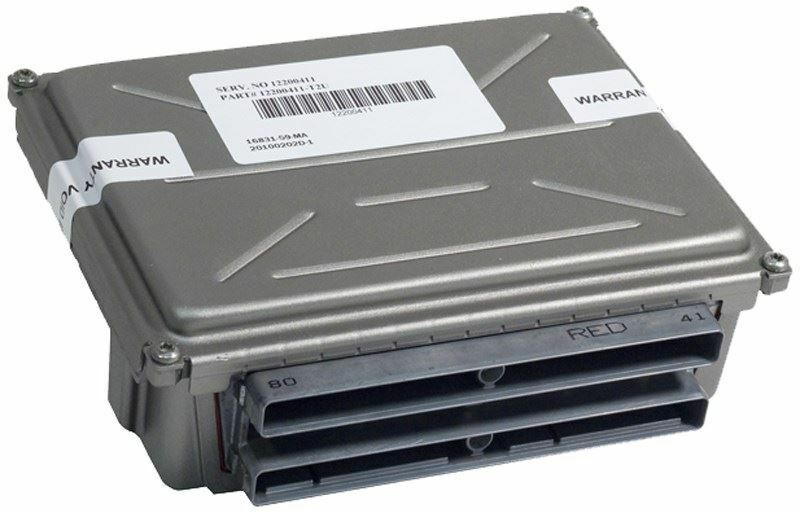Is Your GM Vehicle Running Rough? The PCM Might Be the Culprit.
If your 2003-2005 Buick Century, Impala, Grand Am, or other compatible GM vehicle is experiencing perplexing issues like a persistent check engine light, erratic engine behavior, or transmission problems, the root cause is often a failing Powertrain Control Module (PCM). As the central computer of your vehicle, the PCM is responsible for managing everything from fuel injection and ignition timing to transmission shift points and emissions controls. When it begins to fail, it can create a cascade of problems that are often difficult to diagnose, leading to wasted time and money on unnecessary repairs.
From the Diagnostic Bay
We had a 2004 Chevy Impala come into the shop with a laundry list of complaints: harsh shifting, a check engine light with random O2 sensor and misfire codes, and terrible fuel economy. The owner had already replaced three sensors and a set of spark plugs with no improvement. After hooking up our scanner, we noticed the live data stream was inconsistent—fuel trims were all over the place and sensor voltages were fluctuating wildly. This pointed away from the individual components and towards the central processor. We installed a correctly programmed PCM, performed the security relearn, and the car immediately ran like new. All the phantom codes disappeared, and the transmission shifted smoothly. It’s a classic case where chasing individual codes costs more than addressing the failing brain of the operation.
Common Symptoms of a Failing GM PCM
- ✔ Check Engine Light: The light is on, often with multiple, seemingly unrelated diagnostic trouble codes (DTCs).
- ✔ Poor Engine Performance: You may experience stalling, rough idling, hesitation during acceleration, or a general loss of power.
- ✔ Reduced Fuel Economy: A faulty PCM can’t properly manage the engine’s fuel delivery, leading to a noticeable drop in MPG.
- ✔ Transmission Shifting Issues: The PCM controls the automatic transmission. Failure can lead to harsh shifts, delayed engagement, or getting stuck in one gear (limp mode).
- ✔ No-Start Condition: In severe cases, the PCM can fail completely, preventing the engine from starting at all by not firing the ignition coils or fuel injectors.
- ✔ Failed Emissions Test: Incorrect engine management will almost certainly cause your vehicle to fail a state emissions inspection.
The Direct-Fit Solution: A Pre-Programmed 2003-2005 Century PCM
This Powertrain Control Module, part number 89017735, is the definitive solution to these issues. It’s not just a replacement part; it’s a fully prepared component ready for installation. We take the guesswork and hassle out of the repair by programming the module specifically for your vehicle using your unique Vehicle Identification Number (VIN). This critical step ensures that the PCM has the correct software and calibrations for your vehicle’s specific engine, transmission, and options package. Furthermore, we flash it with the latest software updates available from General Motors, which can resolve factory bugs and improve overall performance and drivability.
This module is a direct replacement for original part numbers 12583827 and 12583826, ensuring perfect compatibility and function. By providing us with your VIN at checkout, you receive a plug-and-play module that restores communication between all your vehicle’s critical systems.
Installation Note
While this module is programmed to your VIN, many GM vehicles of this era require a security relearn procedure after installation. This procedure pairs the new PCM with your vehicle’s anti-theft system and can typically be performed without special tools. Common procedures involve cycling the key in the ignition. We recommend consulting a service manual for the exact steps for your model, or having a qualified technician complete the installation.
Complete Vehicle Fitment List
This electronic control module is compatible with a wide range of General Motors vehicles. Please verify your model and options below:
- Alero: 2003-2004 (3.4L)
- Aztek: 2003-2005
- Bonneville: 2004-2005 (3.8L)
- Century: 2003-2005
- Grand Am: 2003-2005 (3.4L)
- Grand Prix: 2003 (3.1L)
- Impala: 2003-2005
- LeSabre: 2004-2005
- Malibu: 2003
- Montana: 2003-2005
- Monte Carlo: 2003-2005
- Park Avenue: 2004-2005
- Rendezvous: 2003-2005
- Silhouette: 2003-2004
- Venture: 2003-2005
Frequently Asked Questions
Do I have to provide my VIN number?
Yes, providing your VIN is mandatory. We cannot ship your part until we have your vehicle’s 17-digit VIN. This is the only way we can load the correct GM-certified software and calibrations for your specific engine, transmission, and options, ensuring the part works correctly upon installation.
Is any additional programming required after installation?
In most cases, you will need to perform a security relearn procedure (also known as a VATS relearn). This syncs the new PCM to your vehicle’s anti-theft system. This procedure can usually be done without special tools and takes about 30 minutes. Some vehicles may also require a Crankshaft Variation Relearn (CASE Relearn), which requires a diagnostic scan tool.
Will this fix my check engine light?
If the check engine light and associated codes are being caused by a faulty PCM, then this part will resolve the issue. However, it’s crucial to ensure that the codes are not being caused by other failing components like sensors or wiring. This PCM corrects issues originating from the module itself.
Is this a brand new part?
This is a high-quality, inspected, and tested replacement part that has been prepared to meet or exceed original factory specifications. It is loaded with the latest GM software for your vehicle.
Where is the PCM located on my vehicle?
On most of the listed vehicles, such as the Buick Century, Rendezvous, and Impala, the PCM is located in the engine compartment, typically inside the air filter box housing for protection. On models like the Grand Am and Alero, it may be located inside the vehicle, near the center of the dash. Always disconnect the battery before attempting removal or installation.


